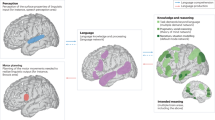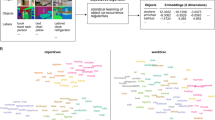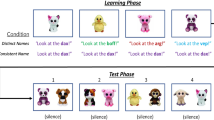Abstract
CRITICAL issues in the cognitive neuroscience of language are whether there are multiple systems for the representation of meaning, perhaps organized by processing system (such as vision or language1–6), and whether further subsystems are distinguishable within these larger ones. We describe here a patient (K.R.) with cerebral damage whose pattern of acquired deficits offers direct evidence for a major division between visually based and language-based higher-level representations, and for processing subsystems within language. K.R. could not name animals regardless of the type of presentation (auditory or visual), but had no difficulty naming other living things and objects. When asked to describe verbally the physical attributes of animals (for example, 'what colour is an elephant?'), she was strikingly impaired. Nevertheless, she could distinguish the correct physical attributes of animals when they were presented visually (she could distinguish animals that were correctly coloured from those that were not). Her knowledge of other animal properties was completely intact, regardless of input stimulus. To explain this selective deficit, these data mandate the existence of two distinct representations of such properties in normal individuals, one visually based and one language-based. Furthermore, these data establish that knowledge of physical atrributes is strictly segregated from knowledge of other properties in the language system.
This is a preview of subscription content, access via your institution
Access options
Subscribe to this journal
Receive 51 print issues and online access
$199.00 per year
only $3.90 per issue
Buy this article
- Purchase on Springer Link
- Instant access to full article PDF
Prices may be subject to local taxes which are calculated during checkout
Similar content being viewed by others
References
Warrington, E. K. & Shallice, T. Brain 107, 829–854 (1984).
Shallice, T. The Cognitive Neuropsychology of Language (eds Coltheart, M., Sartori, G. & Job, R.) 111–127 (Lawrence Erlbaum, Hillsdale, 1987).
Shallice, T. Cognitive Neuropsychol. 5, 133–142 (1988).
McCarthy, R. A. & Warrington, E. K. Nature 334, 428–430 (1988).
Riddoch, M. J., Humphreys, G. W., Coltheart, M. & Funnel, E. Cognitive Neuropsychol. 5, 143–149 (1988).
Caramazza, A., Hillis, A. E., Rapp, B. C. & Romani, C. Cognitive Neuropsychol. 7, 161–189 (1990).
Goodglass, H., Kaplan, E. & Weintraub, S. The Revised Boston Naming Test (Lea & Fibiger, Philadelphia. 1983).
Snodgrass, J. G. & Vanderwart, M. J. exp. Psychol. hum. Learn. Mem. 6, 174–215 (1980).
Coughlan, A. K. & Warrington, E. K. J. Neurol. Neurosurg. Psychiat. 44, 1079–1083 (1981).
Warrington, E. K. & McCarthy, R. Brain 106, 859–878 (1983).
Shallice, T. From Neuropsychology to Mental Structure 269–306 (Cambridge Univ. Press, Cambridge, 1988).
Silveri, M. C. & Gainotti, G. Cognitive Neuropsychol. 5, 677–709 (1988).
Riddoch, M. J. & Humphreys, G. W. Cognitive Neuropsychol. 4, 131–185 (1987).
Sartori, G. & Job, R. Cognitive Neuropsychol. 5, 105–132 (1988).
Ogden, J. A. Brain 108, 1009–1022 (1985).
Paivio, A. Imagery and Verbal Processes (Holt, Reinhart & Winston, New York, 1971).
Beauvois, M. F. Phil. Trans. R. Soc. 298, 35–47 (1982).
teLinde, J. J. exp. Psychol. Learn. Mem. Cognit. 8, 584–598 (1982).
Zimmler, J. & Keenan, J. M. J. exp. Psychol. Learn. Mem. Congnit. 9, 269–282 (1983).
Paivio, A. Mental Representations (Oxford Univ. Press, New York, 1986).
Stewart, F., Parkin, A. J. & Hunkin, N. M. Q. J. exp. Psychol. 44A, 261–284 (1992).
Warrington, E. K. & McCarthy, R. A. Brain 110, 1273–1296 (1987).
Rapcsak, S. Z., Kaszniak, A. W. & Rubens, A. B. Neuropsychologia 27, 1031–1041 (1989).
Silveri, M. C., Daniele, A., Giustolisi, L. & Gainotti, G. Neurology 41, 545–546 (1991).
Rosch, E. J. exp. Psychol. 104, 192–233 (1975).
Damasio, A. R. Cognition 33, 25–62 (1989).
Mesulam, M.-M. Ann. Neurol. 28, 597–613 (1990).
Hart, J. & Gordon, B. Ann. Neurol. 27, 226–231 (1990).
Goodglass, H. & Kaplan, E. The Assessment of Aphasia and Related Disorders 2nd edn (Lea & Febiger, Philadelphia, 1983).
DeRenzi, E. & Vignolo, L. A. Brain 85, 665–678 (1962).
Author information
Authors and Affiliations
Rights and permissions
About this article
Cite this article
Hart, J., Gordon, B. Neural subsystems for object knowledge. Nature 359, 60–64 (1992). https://doi.org/10.1038/359060a0
Received:
Accepted:
Issue Date:
DOI: https://doi.org/10.1038/359060a0
This article is cited by
-
Multiple functions of the angular gyrus at high temporal resolution
Brain Structure and Function (2023)
-
Thinking in Pictures as a Cognitive Account of Autism
Journal of Autism and Developmental Disorders (2011)
-
Knowledge of visual attributes in the right hemisphere
Nature Neuroscience (2006)
-
Neural mechanisms of semantic memory
Current Neurology and Neuroscience Reports (2004)
Comments
By submitting a comment you agree to abide by our Terms and Community Guidelines. If you find something abusive or that does not comply with our terms or guidelines please flag it as inappropriate.



